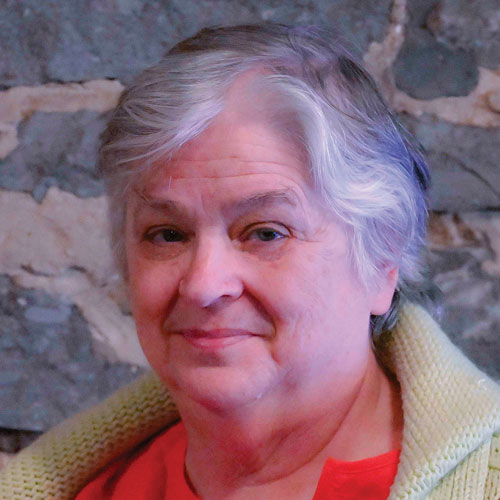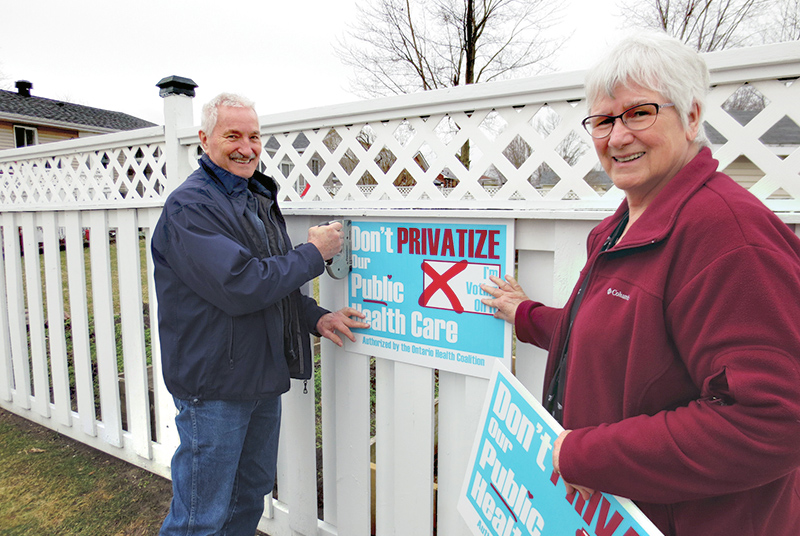Elaine MacDonald commented there are various locations throughout the area where signs can be picked up from, including Rainer Pethke. He can be emailed at rpethke@gmail.com. She also has signs available and can be contacted at 613-330-3117 or by email at elainemacdonald11@gmail.com. Courtesy Photo
CORNWALL – The Cornwall Health Coalition hosted a virtual Cornwall Health Care Privatization Summit on Sat., April 9. Louise Lanctot and Elaine MacDonald, co-chairs of the CHC, moderated the event which featured Natalie Mehra, Dr. Bernard Ho, Linda McQuaig, and Michael Hurley providing information on the health care system in Ontario.
In her opening remarks, MacDonald mentioned the purpose of the summit “to put the brakes on the transformation of public health care into a private for-profit system” by raising awareness of this to the public.
The first speaker of the summit was the executive director of the Ontario Health Coalition Natalie Mehra who MacDonald described as providing inspiration to Medicare defenders by her commitment and work in defending public health care. Mehra spoke on the condition of the long-term care homes during the pandemic.
Concerns in LTC were reported following the intervention and the report of the Canadian Armed Forces in Ontario long-term centres. In her opinion, the Ontario government did not follow through with ensuring those responsible for the lack of care during the pandemic were held accountable. Mehar commented staffing levels meant that LTC residents were often not able to receive even basic care and staff experienced difficulties accessing personal protection equipment. She noted that “staffing levels and long-term care are worse than they were at the beginning of the pandemic” despite government assurances that more staff would be hired for LTC.
She spoke on the plan to continue the privatization of health care in this province with “contracts for profit companies to do COVID testing who are charging people $200 or more per test to get access to a PCR test in Ontario.” She discussed how vaccinations have been privatized, with “plans to privatize our hospital services,” and expressed concern over increased privatization of the health care system in Ontario. Mehra explained how this should be a key election issue in the upcoming provincial election, with the need for a public debate on this issue.
Emergency family and emergency physician as well as an advocate for public health care, Dr. Bernard Ho was the second speaker of the summit. He is a member of the Canadian Doctors for Medicare, an organization “dedicated to strengthening and preserving Canada’s publicly funded health care system. He noted how there are several instances of outsourcing for delivery of health care services such as surgical procedures, COVID-19 vaccines and testing and other medical procedures and these are increasing with recent suggestions from the Ontario government that building or operating private hospitals may be allowed. He raised concerns that the privately run medical facilities may lead to more health care workers leaving the public health care system which could increase wait times for procedures.
Linda McCuaig, Canadian investigative reporter, and writer, spoke on the universality of the health care system in Canada. She described the fight to ensure the continuation of public health care as a “battle for the soul of Canada,” She noted that Tommy Douglas, the founder of Canadian Medicare, was voted the greatest Canadian. She continued how publicly funded health care ensures it is the person who is most in need of care moves to the front of the line, rather the one who has the most money. She mentioned how the provincial funding to health care is low, the inferior nature of private health care facilities when compared to public health care and the public health care system is more economical. McQuaig discussed the case of a doctor in British Columbia who runs a private clinic and allows patients to pay extra to move to the head of the line. The case was heard in the BC Supreme Court, with the doctor losing, but the case will probably be appealed. She mentioned this doctor was in violation of the Canada Health Act as well as “violates every notion we have of equality.”
McQuaig concluded her presentation by discussing the formation of Connaught Labs. This company was formed by Dr. John Fitzgerald, who developed a low-cost effective treatment for diphtheria, and the University of Toronto which led to the development of treatments for several diseases with the goal to make them affordable to all. “It also became one of the world’s leading vaccine producers” before being sold in the 1980s by the Mulroney government to a French pharmaceutical company. She commented how the company wasn’t “willing to switch over to COVID vaccines during the pandemic, they were producing them somewhere else,” so Canadians had to wait for the vaccines produced in other countries.
The final speaker of the summit was president of OCHU/CUPE Michael Hurley. He spoke about the inadequacies of provincial funding to long-term care, then noted “the average mortality rate to COVID of the for-profit facilities was 5.2 per cent,” with the “average death rate of the not for profits 2.8 per cent” and in municipal homes for the aged, which are completely public, the average death rate was 1.4 per cent. He continued how the parent companies of the for-profit facilities, the worse of which had CAF working at selected sites, “were taking out tens of millions of dollars in executive and stock dividends,” questioning “Is it appropriate; is it right that human beings are a profit centre and corporations can deprive them of care to enhance wealth for a relatively small number of people?”
Hurley’s voice became emotional when he described conditions for staff and residents in the for-profit long-term care facilities. He knew from experience of the conditions when doing safety inspections following the redeployment from hospitals of “our people.” He spoke of there being “really no infection control protocols,” residents being denied access to acute care and staff trying to do their best in difficult circumstances, “but being completely inadequately protected.” He expressed grave concern over the announcement by the Ford government concerning the establishment of private hospitals as well as “setting up surgical centres, private colonoscopy and other operations.”
Following a question-and-answer period, MacDonald provided information on the upcoming campaign to strengthen public health care. She summarized that the action plan, currently underway, is able to provide people with the opportunity to request a sign for their lawn or window. She continued individuals can assist the CHC and is seeking to “make health care the biggest issue of conversation” between people. MacDonald suggested people should plan to attend candidate meetings in the upcoming election and asking candidates “for their position or the Party’s position on privatization.”

Carolyn Thompson Goddard, grew up in Chesterville and attended North Dundas District High School. After completing her BA in Political Science at Carleton University she has worked as a medical secretary and library technician. In 2020 she graduated from Algonquin College with a diploma in Journalism and has been a reporter and column writer for The Chesterville Record for over 10 years.









